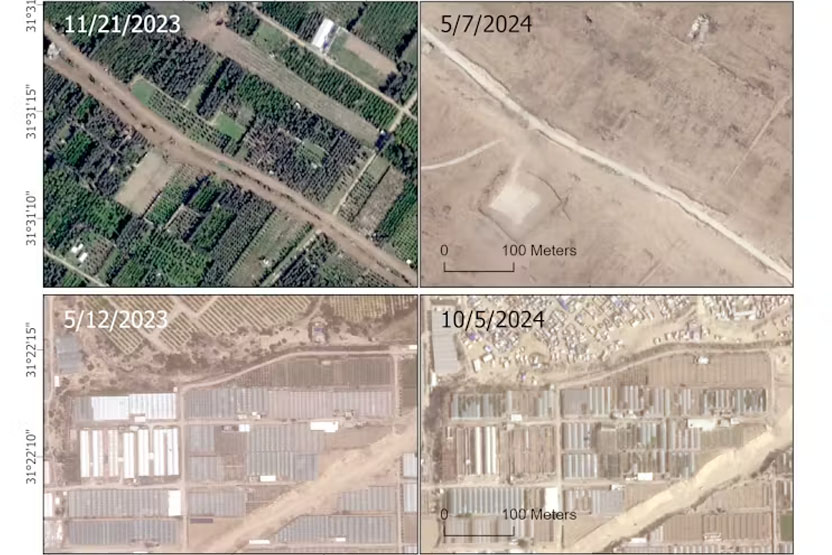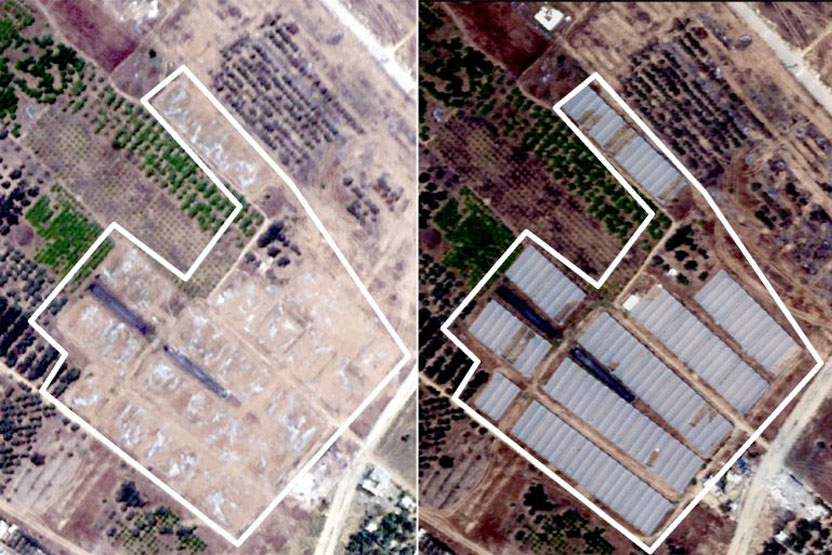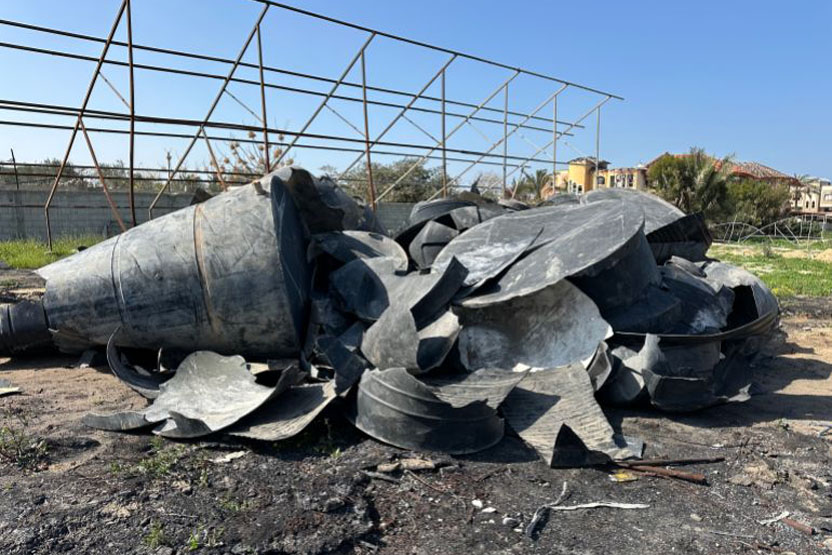Israel has bulldozed and destroyed most of the agricultural areas in Gaza to tighten the means of livelihood for its inhabitants.

Satellite images show the destruction of trees (top) and greenhouses (bottom) in northern Gaza.
According to a special report published by
Al Jazeera News Agency, Israel, in its war on Gaza, is systematically targeting the destruction of agricultural lands as part of its plans for comprehensive destruction and making the Strip uninhabitable. This is coupled with an intensification of environmental destruction, which international and regional organizations and officials have described as constituting an “environmental genocide.”
The Food and Agriculture Organization of the United Nations (FAO) confirmed in an assessment that 95% of the agricultural lands in the Gaza Strip are no longer arable due to the devastation caused by Israel’s destructive war on the Strip.
Bahaa al-Din Al-Agha, Director General of Soil and Irrigation at the Ministry of Agriculture in Gaza, expected that the destruction would extend to all agricultural areas—amounting to about 180 square kilometers—of tree crops such as olives and palm trees, greenhouses planted with vegetables, and field crops, due to the continued bulldozing operations of new land areas.
Al-Agha explained—in a special interview with Al Jazeera Net—that the Israeli aggression has caused more than 50,000 farmers and workers in the agricultural sector to lose their jobs, and they were responsible for supporting nearly a quarter of a million people from their families.
Satellite image highlighting the bulldozing of lands and the destruction of agricultural greenhouses.
Systematic Destruction
The government official warned that the Israeli occupation's bombardment of Gaza’s buildings and lands with tens of thousands of tons of munitions containing heavy metals and toxic substances—which are difficult to dispose of in the short term—will have catastrophic consequences for the soil, which is now unfit for agriculture and is facing challenges of contamination of land, water resources, and air due to these remnants.
Al-Agha stressed that the hazardous materials present in the munitions cause direct and immediate toxicity to plants and animals, leading to increased deaths, stunted growth, stress, disease, and harm to living organisms.
He explained that the effects of explosive materials will extend for decades through biological accumulation within food chains and the concentration of these substances in some living organisms.
He noted that the effects of some types of hazardous materials remain in the soil, groundwater, seawater, and marine sediments for long periods that may last for decades.
Al-Agha pointed out that the chemical properties of explosive materials remain in the debris, and their removal or treatment may lead to risks of direct exposure to them.
Occupation forces even deliberately destroyed household water barrels during their war on Gaza.
Long-Term Effects
Al-Agha, who is considered an expert in environmental affairs, emphasized that the effects of explosives on human health reach lethal levels. TNT (trinitrotoluene) is classified as a potential carcinogen, and prolonged exposure to it can lead to liver and kidney damage, while drinking water contaminated with RDX (Research Department Explosive) affects the nervous system and can cause seizures, convulsions, nausea, and vomiting.
He stated that heavy metals are extremely toxic, especially arsenic, cadmium, chromium, lead, and mercury, and can cause damage to many organs even when exposed to low levels. Chronic exposure to low levels of lead leads to developmental delays and long-term effects on the brain and overall health.
Al-Agha referred to a study conducted after previous wars on Gaza, focusing on soil samples taken from bomb craters in agricultural lands, which showed elevated levels of nickel, chromium, copper, manganese, and lead, constituting a latent danger to the lives of more than two million Palestinians living in the Gaza Strip.
According to Al-Agha, the soil’s recovery from the accumulation of toxic substances requires decades, which would thwart any effort to re-cultivate the land in the near term.
He pointed out the necessity of understanding the extent and type of contamination that has affected the coastal groundwater aquifer to ensure that people are not further exposed to hazardous chemicals and heavy metals in their water or food.
He believes that halting the aggression on the Gaza Strip is a top priority to begin the arduous work of restoring services such as wastewater treatment and solid waste collection and to re-establish safe living conditions for a sector of densely populated land that suffers from water scarcity and pollution and requires extremely precise planning.
Al-Agha called for the concerted efforts of international institutions to contribute—immediately after the cessation of aggression—to the process of removing rubble containing pollutants to prevent their spread and avoid creating new risks for the people of Gaza.
The Food and Agriculture Organization of the United Nations (FAO) confirmed in an assessment that 95% of the agricultural lands in the Gaza Strip are no longer arable due to the devastation caused by Israel’s destructive war on the Strip.
The assessment, based on satellite images, confirmed that Israel’s war targeting both stone and people in the Strip left only about 4.6% of the agricultural land intact.
Translated from Al Jazeera by TiredEarth




Comment
Reply